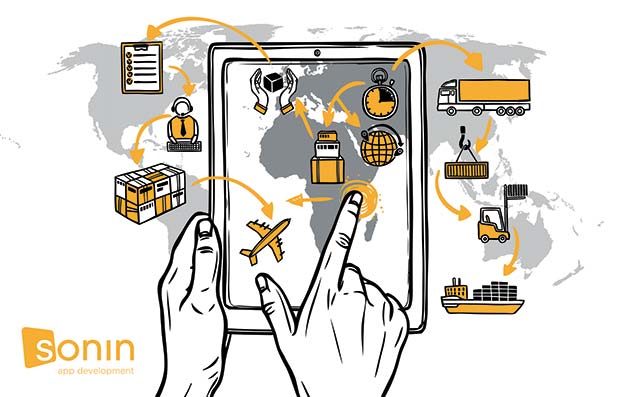The UK logistics sector is huge, worth approximately £55bn to the UK economy, so it’s vital that firms understand the impact that the latest technology can have on a business. Across the globe firms are adopting smart devices and mobile software to achieve business targets, and are seeing a huge impact.

In the logistics industry targets are commonly focused on cutting costs or increasing efficiency, and mobile technology has the ability to address these targets head on.
Distributors, fleet managers and other key personnel within the industry are already using applications to streamline business procedures to hit their targets, particularly within the delivery process.
The requirement to be so transparent is what makes this industry so unique, multiple teams across the business need to access the same data to work in sync. When multiple systems and manual processes are used, communication between teams becomes challenging and can effect resourcing, operations and ultimately sales.
Traditionally, many logistic firms use time-consuming paper processes and expensive hardware to manage pickups and deliveries, which are unreliable, inefficient and costly.
Enterprise applications, which run on various mobiles and tablet devices and across all operating systems (iOS, Android and Windows), give employees the tools to work more efficiently and to a higher standard. It’s been reported that businesses who incorporate enterprise mobility into their workforce see an average of 240 additional work hours being spent by employees compared to those who don’t.
Here’s how mobile apps are impacting the logistics industry:
Going Paperless
During the delivery process there are a number of paper-based documents including invoices, waybills and receipts. These documents are crucial for businesses as they contribute to billing cycles and other internal processes, yet in paper form can be easily misplaced, damaged or not submitted.
Enterprise applications solve this by allowing delivery drivers to load documents straight to their devices, allowing recipients to sign for their items using just their finger. These documents are then automatically converted and sent to recipients for their records and back to the warehouse for filing.
Research has shown that by cutting down on these administrative procedures, businesses are improving their staff efficiency and reducing their overhead costs by 17%.
One device fits all
As delivery workers rely on various technology for their jobs – GPS navigations systems, barcode scanners, telephones and signature capture devices – sometimes the data collated can be distorted or inadequate, affecting traceability for stakeholders. Enterprise applications allow businesses to combine all technology into one reliable platform. By utilizing the built-in hardware on smartphones, drivers can incorporate all required tools into a single application. Not only does this improve efficiency, but also dramatically lowers business spend.
Logistic firms that are distributing smart technology are engaging with a demographic who are already accustomed to engaging with mobile devices and apps on a daily basis. According to a recent Ofcom report, seven in ten adults use mobile apps on a daily basis, and since 67% of delivery drivers already carry smartphones, integrating the enterprise mobility becomes a simple and cost-minimal task for organisations.
Smooth Integration
Information collected from drivers who use enterprise apps can easily be integrated into existing IT systems, so that valuable data can continue to be handled internally.
Another huge benefit of collating information from an enterprise app is that it will track all data in realtime (driver information, dates, shipping times and more). This allows businesses to make informed decisions to improve the all-round performance of the business going forward.
As mentioned earlier, the logistics industry is unique in its departmental transparency, where personnel from different teams need to remain connected.
Integrating with existing back end systems means that the sales teams, project managers, customer services team and the operations support teams, know exactly when an item has been delivered and can track the entire journey when required.
Automation/Other
It’s important to note that the above points are only a small overview of what enterprise mobility can deliver. The technology can also be used to automate tasks, monitor staff, schedule activity, capture data and more.
It’s no doubt that enterprise apps are becoming an essential tool within the logistics industry, which makes it even more important that businesses understand how they can benefit from the technology. The most significant benefit is that applications are bespoke to each business and their end goals, whether it’s to increase revenue, improve the all-round efficiency of an organization or increase customer satisfaction. Whether you’re a multi-national, national or regional firm, every minute passed is a potential revenue-making opportunity.
sonin have worked with a number of companies to utilise the latest in enterprise technology, by understanding the business objectives and challenges, we can ensure you receive the highest quality solution to improve your business. Get in touch and see how we can help you today.
Tel: 01737 45 77 88
Email: info@sonin.agency
James Tee




Comments are closed.